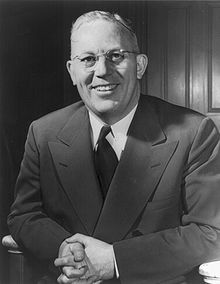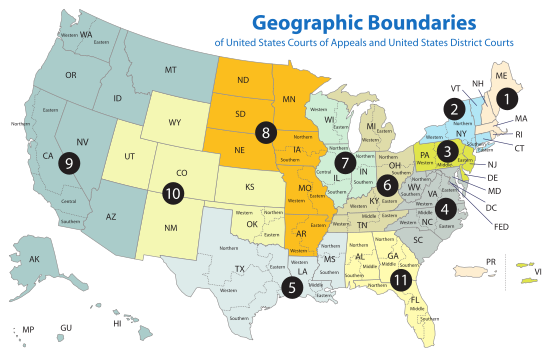- Dwight D. Eisenhower Supreme Court candidates
-
During his two terms in office, President Dwight D. Eisenhower appointed five members of the Supreme Court of the United States: Chief Justice Earl Warren, and Associate Justices John Marshall Harlan, William Brennan, Charles Evans Whittaker, and Potter Stewart.
Contents
Earl Warren nomination
Chief Justice Fred Vinson died in office on September 8, 1953. Eisenhower appointed California Governor Earl Warren as Chief Justice on Oct 5, 1953 by using a recess appointment.[1] In 1952 Warren had stood as a "favorite son" candidate of California for the Republican nomination for President, but withdrew in support of Eisenhower. Warren was reported to have offered to support Eisenhower's campaign in return for an appointment to the Supreme Court at the first possible opportunity. Eisenhower wanted a conservative justice and commented of Warren that "he represents the kind of political, economic, and social thinking that I believe we need on the Supreme Court.... He has a national name for integrity, uprightness, and courage that, again, I believe we need on the Court".[2] Warren was formally nominated on January 11, 1954 and was confirmed by the United States Senate on March 1, 1954 by voice vote.[3]
John Marshall Harlan nomination
Following the death of Justice Robert H. Jackson on October 9, 1954, Eisenhower nominated John Marshall Harlan II on November 9, 1954. Harlan had at the time been sitting on the United States Court of Appeals for the Second Circuit for only nine months.[4] On being nominated, the reticent Harlan called reporters into his chambers in New York, and stated, in full, "I am very deeply honored."[5] The United States Senate did not initially act on his nomination, and Eisenhower had to renominate Harlan on January 10. Harlan's nomination came shortly after the Supreme Court handed down its landmark decision in Brown v. Board of Education,[6] declaring segregation in public schools unconstitutional. Chairman of the United States Senate Committee on the Judiciary, James Eastland, and several southern senators delayed his confirmation, because they (correctly) believed that he would support desegregation of the schools and civil rights.[7] Unlike almost all previous Supreme Court nominees, Harlan appeared before the Senate Judiciary Committee to answer questions relating to his judicial views. Every Supreme Court nominee since Harlan has been questioned by the Judiciary Committee before confirmation.[8] The Senate finally confirmed him on March 17, 1955 by a vote of 71–11.[9] He took seat on March 28, 1955.[10] Of the eleven senators who voted against his appointment, nine were from the South.
William Brennan and Charles Evans Whittaker nominations
Due to ill health, Justice Sherman Minton announced his retirement from the Court on October 15, 1956, remarking that "[t]here will be more interest in who will succeed me than in my passing. I'm an echo."[11] Minton retired only a month before its traditional opening, and less than a month before the Presidential election of 1956, both of which rushed the process to find a replacement.[12] On October 16, 1956, Eisenhower used a recess appoint to seat William Brennan.[1] Presidential advisers thought the appointment of a Catholic Democrat from the Northeast would woo critical voters in the upcoming election for Eisenhower, a Republican.[13]
Brennan gained the attention of Eisenhower's attorney general and chief legal affairs adviser, Herbert Brownell, when Brennan had to give a speech at a conference (as a substitute for New Jersey Supreme Court Chief Justice Vanderbilt).[14] To Brownell, Brennan's speech seemed to suggest a marked conservatism, especially on criminal matters.[14] Other factors playing into Brennan's appointment were his Catholicism, his status as a state court judge (no state judge had been appointed to the High Court since Benjamin Cardozo in 1932), and Eisenhower's desire to appear bipartisan after his appointments of justices Earl Warren and John Marshall Harlan II.[15] Brennan was formally nominated on January 14, 1957.
Before Brennan's nomination was considered by the Congress, Justice Stanley Forman Reed announced his retirement from the Court on February 25, 1957, citing old age. Reed was 73 years old,[16] but had also begun to feel that the Court's jurisprudential center had shifted too far away from him, and that he was losing his effectiveness.[17] Within a week of Reed's retirement, on March 2, 1957, Eisenhower nominated Charles Evans Whittaker to succeed Reed.[18] Both Brennan and Whittaker were confirmed by voice vote in the United States Senate on March 19, 1957.[3]
Potter Stewart nomination
Harold Hitz Burton resigned from the Court due to ill health on October 13, 1958. Five days later, on October 18, 1958, Eisenhower used a recess appoint to seat Potter Stewart on the Court.[1] Eisenhower had previously appointed Stewart to the United States Court of Appeals for the Sixth Circuit, in 1954. Stewart was formally nominated on January 17, 1959 and was confirmed by the United States Senate on May 5, 1959 by a vote of 70-17.[3]
Names mentioned
Following is a list of individuals who were mentioned in various news accounts and books as having been considered by Eisenhower for a Supreme Court appointment:
United States Supreme Court (elevation to Chief Justice)
- Harold H. Burton (born 1888)[19]
- Robert H. Jackson (born 1892)[19]
United States Courts of Appeals
- Court of Appeals for the Second Circuit
- John Marshall Harlan II (born 1899) - (Nominated and Confirmed)[3]
- Court of Appeals for the Sixth Circuit
- Potter Stewart (born 1915) - (Nominated and Confirmed)[3]
- Court of Appeals for the Eight Circuit
- Charles Evans Whittaker (born 1901) - (Nominated and Confirmed)[3]
- Court of Appeals for the D.C. Circuit
- Warren E. Burger (born 1907)[19][20]
- John A. Danaher (born 1899)[19]
United States District Courts
- George H. Boldt (born 1903) - Judge, United States District Court for the Western District of Washington[19]
State Supreme Courts
- William J. Brennan, Jr. (born 1906) - Associate Justice, New Jersey Supreme Court (Nominated and Confirmed)[3]
- Arthur T. Vanderbilt (born 1888) - Chief Justice, New Jersey Supreme Court[19]
Executive Branch officials
- Herbert Brownell (born 1904) - United States Attorney General[19][20]
- John Foster Dulles (born 1888) - United States Secretary of State[19][20]
- Kenneth Claiborne Royall (born 1894) - Former United States Secretary of War under Truman[19]
State Governors
- Thomas E. Dewey (born 1902) - Governor of New York[19][20]
- Earl Warren (born 1891) - Governor of California (Nominated and Confirmed)[3]
See also
- United States federal judge
- Federal judicial appointment history
References
- ^ a b c Michael Brus, What Is a Recess Appointment?, Slate.com (June 14, 1999).
- ^ Personal and confidential To Milton Stover Eisenhower, 9 October 1953. In The Papers of Dwight David Eisenhower, ed. L. Galambos and D. van Ee, doc. 460. World Wide Web facsimile by The Dwight D. Eisenhower Memorial Commission of the print edition; Baltimore, MD: The Johns Hopkins University Press, 1996. Accessed 12 October 2005.
- ^ a b c d e f g h Supreme Court Nominations, 1789-present, senate.gov.
- ^ "Marshall, John Harlan". Federal Judicial Center. http://www.fjc.gov/servlet/tGetInfo?jid=979. Retrieved 2008-08-14.
- ^ Rosenbaum, David E. (September 24, 1971). "'A lawyer's judge; John Marshall Harlan". The New York Times. http://select.nytimes.com/mem/archive/pdf?res=F1061EFC345B1A7493C6AB1782D85F458785F9. Retrieved 2009-04-17. (fee for article)
- ^ 347 U.S. 483 (1954)
- ^ Dorsen, 2006
- ^ "United States Senate. Nominations". United States Senate. http://www.senate.gov/artandhistory/history/common/briefing/Nominations.htm. Retrieved 2008-10-09.
- ^ Epstein, 2005
- ^ Dorsen, 2002, pp. 139–143
- ^ Oyez Project, Supreme Court media, Sherman Minton.
- ^ Eisler, Kim Isaac, A Justice for All: William J. Brennan, Jr., and the decisions that transformed America ( New York: Simon & Schuster, 1993), p. 90. ISBN 0671767879
- ^ James Taranto, Leonard Leo (2004). Presidential Leadership. Wall Street Journal Books. http://books.google.com/books?id=zxBAnuWpg5kC. Retrieved 2008-10-20.
- ^ a b Eisler, a Justice for All, page 85, ISBN 0-671-76787-9
- ^ Eisler, a Justice for All, page 84, ISBN 0-671-76787-9
- ^ Huston, "Justice Reed, 72, to Retire From the Supreme Court," New York Times, February 1, 1957; "Justice Reed Retires From Supreme Court," New York Times, February 26, 1957.
- ^ Fassett, New Deal Justice: The Life of Stanley Reed of Kentucky, 1994.
- ^ "Federal Judge in Missouri Named to Supreme Court," New York Times, March 3, 1957.
- ^ a b c d e f g h i j k l m Yalof, David Alistair. Pursuit of Justices: Presidential Politics and the Selection of Supreme Court Nominees. University of Chicago Press. ISBN 978-0226945453.
- ^ a b c d e Nichols, David. A Matter of Justice: Eisenhower and the Beginning of the Civil Rights Revolution. Simon & Schuster. ISBN 978-1-4165-4151-6.
U.S. Presidents and the Judiciary Supreme Court candidates
and nomination resultsHarding • Hoover • Roosevelt • Truman • Eisenhower • Kennedy • Johnson • Nixon • Ford • Carter • Reagan • Bush • Clinton • Bush • Obama
All Supreme Court nominations • Unsuccessful Supreme Court nominations • Supreme Court demographicsAll presidential
judicial appointmentsJudicial appointment history for United States federal courts • Washington • Adams • Jefferson • Madison • Monroe • Adams • Jackson • Van Buren • Tyler • Polk • Taylor • Fillmore • Pierce • Buchanan • Lincoln • Johnson • Grant • Hayes • Garfield • Arthur • Harrison • Cleveland • McKinley • Roosevelt • Taft • Wilson • Harding • Coolidge • Hoover • Roosevelt • Truman • Eisenhower • Kennedy • Johnson • Nixon • Ford • Carter • Reagan • Bush • Clinton • Bush • ObamaAppointment controversies Johnson • Nixon • Ford • Carter • Reagan • Bush • Clinton • Bush • ObamaCategories:- United States Supreme Court candidates by president
Wikimedia Foundation. 2010.


